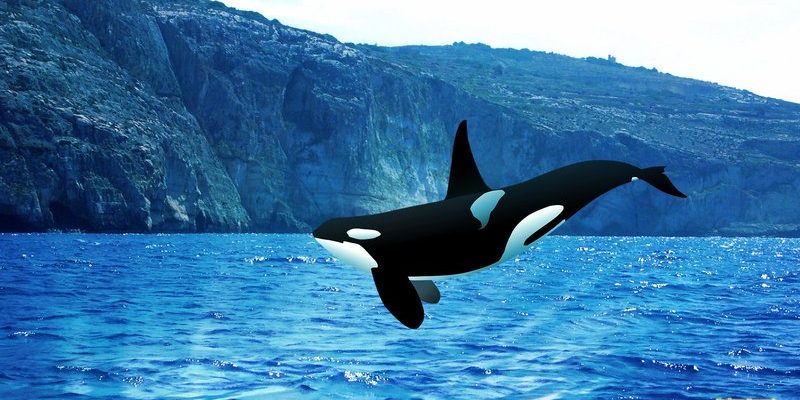
Orcas are fascinating creatures that live in pods and have intricate social structures, much like human families. They’re not just swimming around aimlessly; their behaviors and hunting strategies have significant impacts on their environment. By the end of this exploration, you’ll see how the orca’s role is vital to the health of our oceans, influencing everything from fish populations to the habitat of other marine animals.
Understanding Orcas: More Than Just Predators
Orcas belong to the dolphin family, but they’re the largest species in that group, reaching lengths of up to 32 feet! Their striking black and white coloring make them unmistakable. But what really sets orcas apart is their intelligence and complex social behaviors. They communicate using a variety of sounds, which helps them coordinate hunts and maintain social bonds within their pods.
You might be wondering how their intelligence plays a role in the ecosystem. Well, orcas are highly skilled hunters. They employ various techniques depending on their target. For instance, some orcas hunt in packs to catch seals, driving them to the surface of the water. Others may use a technique called “whale-watching,” where they observe their prey before launching a surprise attack. This level of strategic thinking not only secures their own food but also keeps fish populations in check, preventing overpopulation.
The Predator-Prey Balance
Orcas are at the top of the food chain in the marine environment, and this predatory status brings a sense of balance to the ocean’s ecosystem. By preying on smaller fish, seals, and even other whales, orcas help regulate their populations. This process is essential because if a particular species becomes too prolific, it can lead to overgrazing of resources—a bit like having too many guests at a dinner party, where there’s not enough food to go around.
For example, when orcas hunt seals, they target the weaker individuals, which helps maintain a healthy seal population. This selective hunting allows for the survival of the fittest, benefiting the overall health of the species. You might say it’s nature’s way of ensuring that the “dinner party” remains enjoyable for everyone involved in the ocean’s ecosystem.
Impact on Marine Biodiversity
The influence of orcas extends beyond their immediate hunting practices; they also affect other marine species. When orcas predate on certain fish populations, it allows other species to thrive. This is significant because diverse marine life contributes to a more resilient ecosystem. Think of it as an orchestra; each species plays its own note, and orcas help keep the harmony intact.
One example of this is the relationship between orcas and salmon. In regions like the Pacific Northwest, orcas depend heavily on salmon as a food source. By keeping salmon populations regulated, orcas indirectly support the health of aquatic plant life that salmon rely on for spawning. When orcas thrive, it creates a healthier environment for many other species, creating a positive ripple effect throughout the ecosystem.
The Role of Orcas in Nutrient Cycling
Nutrient cycling is crucial for marine ecosystems, and orcas play an unexpected role in this. After orcas hunt and consume their prey, they release nutrients back into the ocean through their waste. This process enriches the water, promoting the growth of phytoplankton, which forms the base of the marine food web.
Here’s where it gets interesting: healthier phytoplankton means more food for tiny fish, which in turn supports larger fish, marine mammals, and even seabirds. In essence, orcas are like the recycling bins of the ocean, ensuring that nutrients are continuously cycled and reintroduced into the system. This cycling is vital for sustaining life in marine ecosystems.
Human Impacts on Orcas and Their Habitats
Unfortunately, orcas face many threats today due to human activities. Overfishing can severely impact their food sources, while pollution can harm their health and breeding success. Habitat degradation, such as coastal development, also affects their populations. As their environments become less hospitable, the entire marine ecosystem can feel the impact.
You might be wondering how all this fits together. If orcas are struggling, the balance of the marine ecosystem begins to shift. For instance, a decline in orca populations can lead to an overabundance of seals, which can then overgraze fish populations. This creates a domino effect that can disrupt the ecological balance, affecting everything from sea turtles to seabirds.
Conservation Efforts and the Future of Orcas
With all the challenges orcas face, conservation efforts are crucial. Organizations worldwide are dedicated to studying orca populations and their habitats. They work on initiatives to reduce pollution and overfishing, which are some of the biggest threats to orcas.
For example, efforts like creating marine protected areas can offer orcas safe places to hunt and breed, which helps preserve their populations. Additionally, education is key. By raising awareness about the role of orcas in marine ecosystems, we can encourage more sustainable practices that protect these amazing creatures.
Here’s the thing: every action we take can have a ripple effect. By supporting orca conservation, we’re not just helping one species—we’re protecting the entire marine ecosystem. It’s like planting a tree; while one tree may seem small, it can grow into a lush forest that supports countless life forms.
Orcas, or killer whales, play an irreplaceable role in marine ecosystems. From maintaining balance in predator-prey relationships to cycling nutrients back into the ocean, these intelligent mammals have a profound impact on the health of our oceans. As we face the challenges of pollution, climate change, and habitat destruction, understanding the importance of orcas becomes more vital than ever.
So, the next time you hear about orcas, remember they’re not just magnificent animals; they’re crucial to life under the sea. By supporting conservation efforts and being mindful of our actions, we can ensure that orcas—and the entire marine ecosystem—thrive for generations to come.

